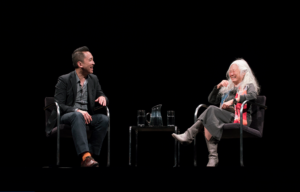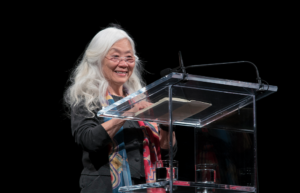Tags
Related Posts
Share This
Viet Thanh Nguyen and Maxine Hong Kingston at Lannan

Viet Thanh Nguyen and Maxine Hong Kingston have a conversation. Photo by Don Usner.
On the night of March 29, the Lannan Foundation hosted a reading and conversation with writers Viet Thanh Nguyen and Maxine Hong Kingston at Santa Fe’s Lensic Performing Arts Center. Nguyen has received many awards for his writing. With work such as Nothing Ever Dies: Vietnam and the Memory of War (2016) and The Refugees (2017) under his belt, he’s proven to be a force in Asian American literature. The Sympathizer (2015), his debut novel, won many awards including the 2016 Pulitzer Prize for Fiction and the Dayton Literary Peace Prize, among others. He was born in Vietnam and came to the United States as a refugee with his family in 1975.
Sharing the stage with Nguyen was Maxine Hong Kingston, celebrated Chinese American writer. Her work touches on Asian immigrants’ experiences in America and includes The Woman Warrior: Memoirs of a Girlhood Among Ghosts (1976), a mixture of memoir and myth that won the National Book Critics Circle Award for nonfiction in 1976; China Men (1980); Tripmaster Monkey, His Fake Book (1989) and The Fifth Book of Peace (2003), among others. She received many awards for her thoughtful work, and in 2013 she received the National Medal of Arts from President Barack Obama.
The night started with Kingston introducing Nguyen. “Viet offers us the hope that just memory, and an ethics of memory, can possibly bring reconciliation and peace,” Kingston said, speaking of Nguyen’s nonfiction work, Nothing Ever Dies: Vietnam and the Memory of War. Nguyen happens to be Kingston’s former student, and their playful conversation created a comfortable and personal atmosphere. When Nguyen took the stage later on, he explained that when he was completing his undergrad at the University of California, Berkeley, he heard that Kingston was teaching a nonfiction class and knew he had to get into it.
“I’m gratified and honored that Viet quotes from my work. He says that I capture the ethical challenge for writers who speak about terrible events. He praises my story, ‘The Brother in Vietnam,’ for showing that when a solider squeezes the trigger, the entire nation is behind; all working in conjunction with mind, memory, imagination and fantasy,” Kingston said. “What he says about my work are challenges, standards, ideals that he sets for himself. And he reaches them.” As Kingston spoke of Nguyen, she sounded proud and grateful for his presence, both as a person and as a writer. “I do feel inspired and uplifted that Viet’s young generation is carrying on the work for peace and justice after me,” she said.
She then related his work to the current state of America. “The Refugees has come out at precisely the right time. Just the title, boldly on the book jacket, serves as a protest sign. Our country has yet another chance to save the lives of refugees. And, once again, we deny them haven,” Kingston said. “All my life, my family has feared deportation because we were illegal immigrants, and descendants of illegal immigrants. I did not think to name them not immigrants, but refugees. In The Refugees, Viet gives each refugee a face and a story.”
As Nguyen first took the stage, he approached the podium and said, “First thing’s first,” before taking out his cell phone and snapping a picture of the crowd. “I can’t help it, I’m Asian.” The audience laughed, and this set the tone for the rest of the event, in which Nguyen mixed the humorous and the serious in a refreshing way. He went on to read a passage from Nothing Ever Dies: Vietnam and the Memory of War. “I was born in Vietnam, but made in America…” it starts. The passage speaks of the confusion that comes with being “a man with two countries” and being a part of both the Vietnamese and American revolutions. He mentions the importance of how memories are made and forgotten. The revolutionary histories of both Vietnam and America are important to him.
“I think there really is hope, even as I bring up this history of revolutions that have failed to live up to their ideals. I think there is hope because these revolutions have left traces in our memory of what they aspire to be, what they can be. And a record of the struggles that people in the generations before us have undergone can make those revolutions happen,” Nguyen said. “And it’s important to have that sense of history, and that sense of time, and that sense of previous struggle. Especially in an era like this, I think, when so many people of a certain inclination are shocked, are taken aback, that their country has turned in a certain direction that they didn’t think was possible. But if you have a sense of history you know it’s very, very possible; that even though we’re living in discouraging times for some of us, for people like me, these are not new times.”

Maxine Hong Kinston introduces Viet Thanh Nguyen. Photo by Don Usner.
Throughout the night, the two joked about how Nguyen would fall asleep in class back at UC Berkeley, and about the note he received at the end of the year from her, saying that he needed to open himself up to his peers. He said he was awake politically, but not emotionally, and talked about how he spent a lifetime trying to contain emotions, when “to be a writer means to try to excavate them.”
Part of this excavation, as a writer, can involve examining personal sources of inspiration. Nguyen talked about Ralph Ellison’s Invisible Man’s profound impact on him when he first read it. “Somewhere in me at that time I thought, ‘Maybe one day I can hope to aspire to write something like this. So when it came down to plot in The Sympathizer, and trying to figure out what the architecture of the book was, I very much thought about Invisible Man.”
He said he’s very inspired by African American literature, and even named his son Ellison. After reading Invisible Man again, he said that he still loved it, but found that he also disagreed with it. “He emerges at the end of the book thinking he has something to contribute after all, as an individual.” That’s where Nguyen disagreed. He said this is one reason why Invisible Man was as recognized as it was in the 1950s, because it spoke to the political mood of the day that had “grappled with communism and rejected it in favor of the American individual.”
In reference to The Sympathizer, Nguyen talked about duality. He said he felt like he was an American person spying on his parents when at home, and then a Vietnamese person spying on Americans when he was outside. The Sympathizer gives the reader both sides of a war story, and, in Kingston’s words, enables the reader to “question who is enemy and who is friend.” Nguyen mentioned that initially, editors wanted the ending of the book to be very anti-Communist, and pro-“America.” Thirteen out of fourteen publishers rejected the manuscript. Though no one explicitly told him this was the reason, he said, “I think it’s hard not to think that I didn’t give them the happy ending, the hopeful ending, which is the American ending.”
As Nguyen reflected on his experiences, and said that he wanted to humanize Vietnamese people, Kingston’s words from the beginning of the night resonated. “The work of literature is to create compassion in the reader.”






 Jackalope Magazine is the student magazine of Santa Fe University of Art and Design. Building on the interdisciplinary nature of our education, we aim to showcase the talent of our university and character of our city.
Jackalope Magazine is the student magazine of Santa Fe University of Art and Design. Building on the interdisciplinary nature of our education, we aim to showcase the talent of our university and character of our city.
Recent Comments